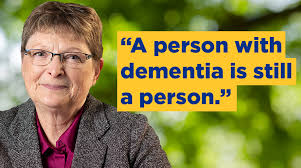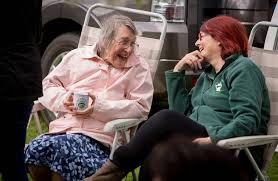As we age there are two words that can strike fear in the hearts of any senior and those two words are DEMENTIA and ALZHEIMERS. Not one person alive, old or young, wants to consider the thought that they may get lost in their own minds and be unreachable even as their bodies remain firmly in need of care. This thought can make your blood run cold, and will turn your legs into jello. I am not trying to be a Debbie Downer here, but the truth is that there are a few things you can be doing right now to hopefully stave off either of these two conditions.
We have been talking about ways to mitigate these two conditions almost from the beginning of this blog. We always talk about exercise, mental stimulation, staying social, learning new things, practicing gratitude, being mindful and other various ways to improve our lives as we age. It should not surprise you that these interventions are also the way to stay mentally healthy. You can read older blog posts about this topic here.
Retirement means freedom and time to do the things we put off due to family and time issues while working. However, the risk of developing dementia, a broad term that encompasses various cognitive impairments, including Alzheimer's disease, significantly impacts the elderly population. Today let's examine the risks associated with dementia as we age and discuss ways to mitigate these risks.
The Growing Concern
Dementia is not a normal part of aging, but the risk of developing dementia increases as we get older. According to the World Health Organization, around 50 million people worldwide have dementia, with nearly 10 million new cases every year. Most of these individuals are over the age of 65. This statistic is a stark reminder of the importance of understanding and preparing for the potential risks as we age.
Risk Factors for Dementia
Several factors can increase the risk of developing dementia. Some of these are modifiable, while others are not.
Key risk factors include:
- Age: The most significant risk factor for dementia is age, particularly after 65 years.
- Genetics: Family history plays a role, especially in cases of early-onset dementia.
- Lifestyle and Heart Health: Poor heart health due to factors like hypertension, high cholesterol, obesity, and diabetes can increase dementia risk.
- Brain Injuries: Severe head trauma may increase the risk of certain types of dementia.
- Mental Health: Depression and prolonged stress might contribute to the risk of dementia.
Reducing the Risk
While we cannot change factors like age and genetics, there are several ways to reduce the risk of dementia:
- Stay Physically Active: Regular physical activity helps maintain good blood flow to the brain and encourages new brain cells.
- Eat a Healthy Diet: Diets like the Mediterranean diet, rich in fruits, vegetables, whole grains, and lean proteins, can support brain health.
- Mental Stimulation: Engaging in activities that challenge your brain, like puzzles, reading, and learning new skills, can build brain resilience.
- Social Engagement: Staying socially active can protect against dementia by reducing stress levels and maintaining emotional health.
- Regular Health Check-ups: Managing heart health and mental health can significantly reduce dementia risk.
Early Signs and Seeking Help
Recognizing the early signs of dementia is crucial. These can include memory loss that disrupts daily life, challenges in planning or solving problems, difficulty completing familiar tasks, confusion with time or place, and changes in mood and personality. If you or a loved one experiences these symptoms, it's important to consult a healthcare professional.

As we cherish our retirement years, being mindful of our cognitive health is as important as taking care of our physical well-being. By understanding the risks associated with dementia and taking proactive steps to mitigate these risks, we can aim for not just a longer life but a fuller, more vibrant one.
Remember, aging is an inevitable journey, but how we age is something we can influence. Let's embrace these years with awareness and grace, ensuring our minds stay as active and healthy as our bodies.










No comments:
Post a Comment